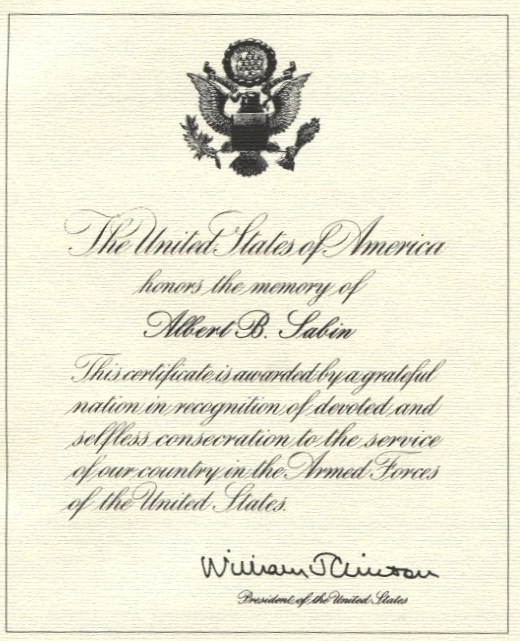
Page from the booklet called, "A Tribute to Albert B. Sabin." This is a copy of a certificate signed by former President Bill Clinton.
The nineteenth anniversary of Dr. Albert B. Sabin’s passing has recently occurred. In memory of Dr. Sabin, I thought I would take a look at some materials that were published shortly after he passed away on March 3, 1993. An introduction to the 1993 issue of Biologicals paying homage to Dr. Sabin said, “The contributions of Albert B. Sabin to modern virology and to public health remain so huge and his personality was so rich and unusual, that it is difficult to pay proper homage in a short article.”[1] This quote is still very true today, but hopefully these materials can share some insight into how friends and colleagues felt at the time.
His obituary in JAMA stated, “Dr. Sabin’s extensive work in the international testing of vaccines led to important research toward his lifelong goal of global eradication of both poliomyelitis and measles. […] Dr. Sabin and his colleagues pioneered a direction that may ultimately succeed in mass vaccination in nonaffluent countries where injectable vaccination programs have failed.”[2]
Another of Dr. Sabin’s obituaries appeared in Nature in April 1993. This obituary was written by Dr. Hilary Koprowski, a polio researcher who developed an oral vaccine around the same time that Dr. Sabin did. Dr. Koprowski called Dr. Sabin “one of the heroes of [the era of poliomyelitis research]” and “courageous and wise.” He also acknowledged that he and Dr. Sabin didn’t always see eye to eye, writing, “At one time, Sabin and I became adversaries over the selection of polio virus strains to be used as oral vaccines. This did not affect our long-lasting friendship and mutual respect.”[2] The relationship between Dr. Sabin and Dr. Koprowski is very important to the history of poliomyelitis research and poliovirus vaccines. I hope to explore it in a later blog.
In the Hauck Center for the Albert B. Sabin Archives, we have a booklet called “A Tribute to Albert B. Sabin,” which includes eulogies from his memorial services. A notable speaker at his memorial service on March 8, 1993 was Dr. Robert Chanock, a colleague who also trained in Dr. Sabin’s laboratory. Calling him “an authentic giant of modern medicine,” Dr. Chanock briefly told the story of Dr. Sabin’s successful attack on polio – from research to vaccine to national immunization days. Dr. Chanock also noted that Dr. Sabin was seen as a “medical statesman,” saying:
Praise from Albert Sabin represented one of the highest levels of approbation to which a young biomedical scientist could aspire. On the other hand, Albert had a strong belief that science must be reserved for individuals who were totally competent, and when he detected imperfections in experimental designs of defects in interpretation of data, his response was rapid and incisive.
Dr. Chanock concluded his eulogy by saying, “[…] I am certain that if there is an afterlife, Albert will have already begun his campaign to seek solutions to its outstanding problems.”[3] The Sabin collection contains many letters between Drs. Sabin and Chanock, and in a future blog, I plan to explore their relationship further.
What truly sums up Dr. Sabin is a quote of his own that appeared in the April 28 issue of JAMA, “A scientist who is also a human being cannot rest while knowledge which might be used to reduce suffering rests on the shelf.”[5]
References
[1] Joseph L. Melnick and Florian Horaud, “Albert B. Sabin,” Biologicals 21 (1993): 299.
[2] Lawrence D. Grouse, “Albert B. Sabin,” JAMA 269, no. 16 (1993): 2140.
[3] Hilary Koprowski, “Albert B. Sabin (1906-1993),” Nature 362 (1993): 499.
[4] “A Tribute to Albert B. Sabin,” August 23, 1993. Found in the Sabin Archives.
[5] Grouse, 2140.
In 2010, the University of Cincinnati Libraries received a $314,258 grant from the National Endowment for the Humanities (NEH) to digitize the correspondence and photographs of Dr. Albert B. Sabin. This digitization project has been designated a NEH “We the People” project, an initiative to encourage and strengthen the teaching, study, and understanding of American history and culture through the support of projects that explore significant events and themes in our nation’s history and culture and that advance knowledge of the principles that define America. Any views, findings, conclusions, or recommendations expressed in this blog do not necessarily reflect those of the National Endowment for the Humanities.
